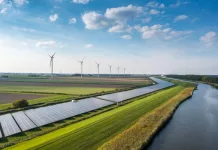Electrifying Airport Operations
The aviation sector is a significant contributor to global greenhouse gases, with airports leaving a considerable carbon footprint. To mitigate environmental impacts, the focus on electrifying airport operations has never been more pertinent. In this era where sustainable energy is critical, initiatives are underway to pioneer a greener path for transportation services within U.S. airports.
Athena: A Beacon for Eco-Friendly Airports
Enter Athena, an innovative project supported by the U.S. Department of Energy’s Vehicle Technologies Office and steered by the National Renewable Energy Laboratory alongside Oak Ridge National Laboratory. Launched in 2018, Athena serves as the vanguard for helping transportation hubs, notably the Dallas Fort Worth International Airport, to adopt clean technologies and meet ambitious environmental targets.
Revving Up with Athena Zero-Emissions Vehicles Project
The Athena project has entered an exhilarating new chapter with the initiation of the Athena Zero-Emissions Vehicles (Athena ZEV) project. Its focus is on de-risking airport investments by moving towards electrification, starting with rental car fleets. Athena ZEV looks to address the challenges of integrating electric vehicles (EVs) into the bustling environment of airport ground transportation.
The Power Surge of EV Charging at Airports
Rental companies eyeing a more electric future need the power to match, necessitating advanced strategies to deploy high-power charging systems. The projected demands are considerable, likened to powering an entire airport terminal. NREL’s senior data science researcher, Monte Lunacek, underscores the significance of innovative solutions to meet such energy needs.
Intelligent Simulation for Sustainable Solutions
Using data-driven models, machine learning, and sensor networks, researchers have successfully simulated an airport’s mobility demands, forecasting energy needs and sustainable strategies with what is akin to a ‘digital twin’ of DFW’s transportation systems.
Complexity Meets Innovation in Airport Decarbonization
The ongoing project Athena ZEV is mapping out a comprehensive plan to understand airport energy landscapes thoroughly. This involves considering how to effectively manage electrical systems and strategize around costs and customer service whilst advancing decarbonization.
Building on Solid Groundwork with ARIES
A New toolset, including the ARIES research platform, is being adopted to simulate and validate megawatt-scale solutions, aiming to evolve past developments into pragmatic, cost-effective strategies for DFW’s electrification efforts.
The Ecosystem Approach for Total Electrification
This innovative project uses an ecosystem viewpoint, evaluating energy demands across all transportation modes within the airport – ranging from shuttle buses to electrified aircraft. The goal is to create a completely electric transportation hub.
Collaborative Spirit Driving Decarbonization Forward
The August launch meeting for Athena ZEV brought together a diverse group of stakeholders, creating a contagious energy around the potential for airport electrification and setting the stage for collective progress.
Strategies for Scalable Airport Electrification
Athena ZEV is not only concentrating on DFW but is also sharing its insights to inspire similar sustainable initiatives in airports across the country. It aims to craft tools designed for broad and efficient replication to support widespread adoption of EV technology.
Creating Impactful Tools for Decarbonization
Juxtaposed with the technical prowess of NREL, the human partnerships are invaluable. An advisory board for Athena ZEV is being established to guide the course and ensure the project’s success, emphasizing the role of collaboration in moving towards a sustainable energy future.
Join the Journey in Sustainable Mobility
NREL’s research continues to be at the forefront of sustainable transportation, and keeping conversant with the latest breakthroughs is made easy with resources like the Sustainable Mobility Matters newsletter.
Article reformatted and redistributed, original courtesy of NREL, by Justin Daugherty.

























